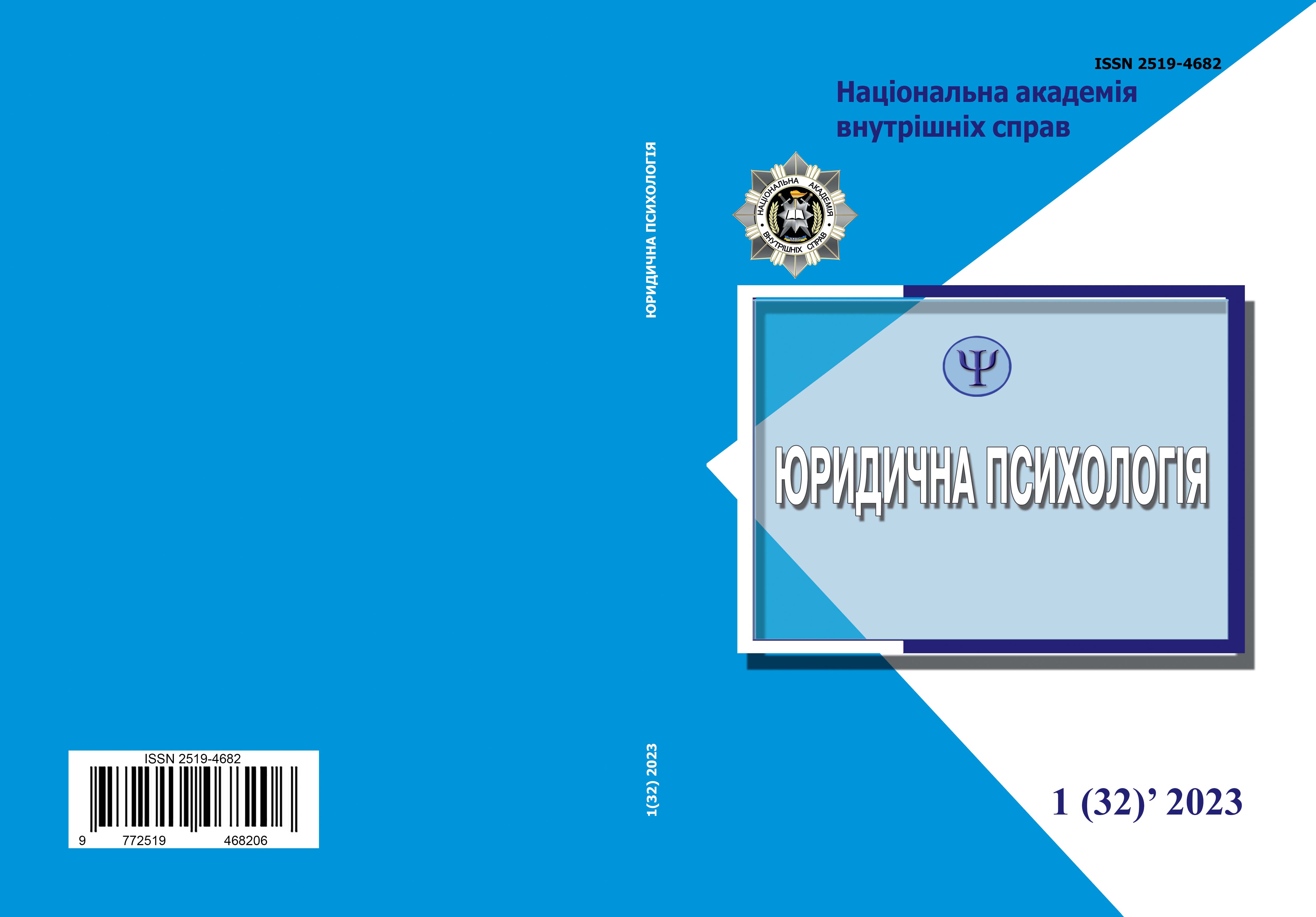Prerequisites for the Legitimate Manifestation of Aggression in the Professional Activities of Police Officers
Abstract
Abstract. Determinate the prerequisites for the legitimate manifestation of aggression in police activity. A complex of methods was used in the scientific research, which includes: theoretical (analysis, synthesis, comparison, generalization and interpretation of literary sources and theoretical approaches on selected issues), empirical methods (survey, testing); mathematical and statistical methods. The method of quantitative analysis (correlation analysis) was used to process empirical data. Methodological support of the psycho-diagnostic research was carried out with the help of the following methods: 1. The author’s questionnaire "Aggression in the activity of a policeman". 2. Buss-Durkee Hostility Inventory; 3. Rotter’s Internal-External Locus of Control Scale. 4. Morosanova’s Style of self-regulation of behavior; 5. Questionnaire of the level of legitimization of aggression "LA-44". 6. Wagner’s "Hand-test". In the scientific research was: 1) the prerequisites of legitimate manifestation of aggression in the activities of police officers were empirically studied. 2) the relationship between the indicators of the methods was revealed using correlation analysis. Legitimized aggression in the professional activity of police officers is determined by the acceptability and justification of various forms of aggressive behavior by attributing a socially approved (legitimate) status. Based on the results of the questionnaire, it can be concluded that, on the one hand, the showing of aggression in the activities of a police officer is not acceptable, and on the other hand, it is allowed – it is legitimized, and everything depends on the specific situation. The reasons for the manifestation of aggression can be statements towards a police officer that demean his honor and dignity, a sense of injustice, and the difficulty of self-regulation of a police officer in critical situations. Aggression is justified and approved (legitimized) in official activities, in particular, in situations where aggressive actions are taken against the police officer himself and disobedience to his legal requirements is carried out. With the help of correlation analysis, the prerequisites for the legitimate manifestation of aggression by law enforcement officers were revealed. Police officers who have a high level of aggressiveness can resort to approving various forms of aggression, giving them a legitimate status. The predominance of the external locus of control of police officers negatively affects the perceived self-regulation of the police officer, the independence, flexibility and adequacy of the reactions of police officers, which can hinder the achievement of the goal and the efficiency of the performance of official duties, including excessive, uncontrolled manifestation of aggression. The prospect of further research is the development of recommendations for the prevention of excess of official duties
Keywords: law enforcement officer; level of aggressiveness; aggressive behavior; National Police of Ukraine; self-regulation of behavior; danger; conflict; aggressiveness index
Downloads
References
Білаш А. М. Cпецифіка легітимізованої агресії у дівчат- і хлопців-старшокласників. Особистість, суспільство, закон: психологічні проблеми та шляхи їх розв’язання : тези доп. Міжнар. наук.-практ. конф. (Харків, 30 берез. 2017 р.) Харків, 2017. С. 16–18.
Гриб Н. Профілактика деструктивної агресивності у військовослужбовців. Вісник Київського національного університету імені Тараса Шевченка. 2018. № 4. С. 38–41. (Серія «Соціальна робота»). doi: 10.17721/2616-7786.2018/4
Гуменюк Л. Й., Сулятицький І. В. Психологія професійної діяльності працівників органів внутрішніх справ : навч. посіб. Львів : ЛьвДУВС, 2011. 648 с.
Котляр Ю. В. Визначення норм виконання психодіагностичної методики Басса-Дарки для категорії працівників. Наука і правоохорона. 2015. № 2. С. 235–242.
Кудерміна О. Психологічні особливості професійного спілкування суб’єктів правоохоронної діяльності. Проблеми сучасної психології. 2019. № 12. С. 538–547. doi: 10.32626/2227-6246.2011-12.%25p
Литвин В. В. Комунікація поліцейського патрульної поліції. Юридична психологія. 2019. № 2 (25). С. 93–99. doi: 10.33270/03192502.93
Медведєв В. С. Особистість слідчого як проблема юридичної психології. Право і безпека. 2019. № 1 (72). С. 97–103. doi: 10.32631/pb.2019.1.13
Morosanova V. I. Self-regulation and personality. Procedia-Social and Behavioral Sciences. 2013. Vol. 86. P. 452–457. doi: 10.1016/j.sbspro.2013.08.596
Morosanova V. I., Fomina T. G. Self-regulation as a Mediator in the Relationship between Anxiety and Academic Examination Performance. Procedia-Social and Behavioral Sciences. 2017. Vol. 237. P. 1066-1070. doi: 10.1016/j.sbspro.2017.02.156
Охріменко І., Мартенко О. Психологічні детермінанти формування іміджу поліцейського. Юридична психологія. 2021. № 2 (29). С. 20–28. doi: 10.33270/03212902.20
Романенко О. В. Формування навичок медіації в майбутніх правоохоронців. Юридична психологія. 2022 № 2 (31). С. 106–112. doi: 10.33270/03223102.106
Rotter, J. B. Generalized expectancies for internal versus external control of reinforcement. Psychological Monographs: General and Applied. 1966. No. 80 (1). P. 1–28. doi: 10.1037/h0092976
Шевченко Л. О., Шломін О. Ю. Професійно-особистісні якості працівників підрозділів превентивної діяльності національної поліції на різних етапах професійного становлення. Рsychological journal. 2019. № 10. С. 143–155. doi: 10.31108/1.2019.5.10
Ситнік С. В. Конфліктна поведінка у осіб з різним локусом контролю Науковий вісник Ужгородського національного університету. 2021. № 4. С. 65–71. doi: 10.32782/psy-visnyk/2021.4.13
Цільмак О. М. Еталонний психологічний профіль вольових якостей слідчого. Юридична психологія. 2020. № 1. С. 55–61. doi: 10.33270/03202601.55
Abstract views: 96 PDF Downloads: 125
- Authors reserve the right to authorship of their own work and transfer to the magazine the right of the first publication of this work under the terms of the Creative Commons Attribution License, which allows other persons to freely distribute published work with mandatory reference to authors of the original work and the first publication of an article in this magazine.
- Authors have the right to enter into separate additional agreements on non-exclusive dissemination of the work in the form in which it was published in the journal (for example, to post an article in the institution's repository or to publish as part of a monograph), provided that the link to the first publication of the work in this journal is maintained.
- The journal's policy allows and encourages the posting of articles by authors on the Internet (for example, in electronic storehouses of institutions or on personal websites), both before the submission of this manuscript to the editorial office and during its editorial processing, as this contributes to the creation of a productive scientific discussion and positively affects the efficiency and dynamics of citing the published work.




